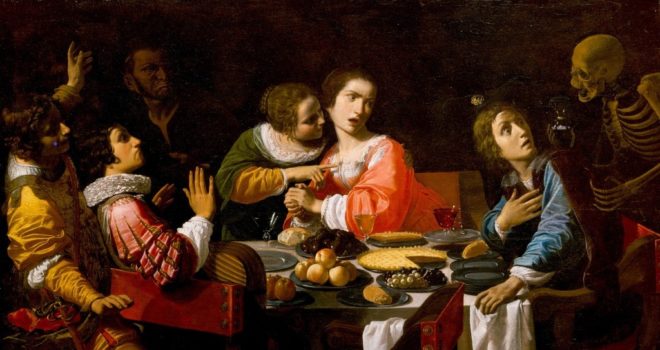It happened suddenly. My 49-year-old husband with whom I had been talking just a few minutes before was undergoing some kind of seizure, stopped breathing a few times, and was unconscious. The ambulance whisked him away to the hospital where he had a second massive heart-attack. The cardiologist was preparing me for the worst. My desperate attempts to get him the last rites failed because of Corona-policies. But, thanks to God and the excellent doctors, his life was saved. He came out of this with an implanted cardiac defibrillator, making it possible for him to lead a normal life.
However, he remembers nothing—or almost nothing. He had no clue he was in danger of death and had no time to prepare. Luckily, he’d been to confession not long before this incident. Still, one hopes to have some time to collect oneself, make a last act of contrition. Had he died, God in His mercy might have given him the opportunity for a last act of repentance. People, after all, talk about life flashing in front of their eyes. But one can’t count on it and one certainly shouldn’t.
There are two temptations when it comes to death. Either believing that one will have time for a last-minute conversion or despairing of the mercy of God and not even attempting to repent. I’d like to focus on the first today.
We are told that we can turn things around until the last moment and that is true. As long as we are within time and space we can change—but eternity makes these kinds of fundamental decisions impossible (though we will be freely able to continue to choose the good and to grow in our love for God—“further up and further in”, as the new inhabitants of the Narnian Heaven say in The Last Battle). But we underestimate the inflexibility of a hardened heart. It is sometimes easier for stones to praise God than for the human heart to do so. No miracles of Christ were greater than the conversions of heart He brought about, but even He could not perform them without the person’s assent.
If we have been making wrong decisions for a long time, it is not easy to make a 180-degree turn. The worse we’ve been, the harder it seems to be. For recognizing one’s sins means an excruciating stripping: understanding that all one has done, all the hardships endured for the false idols one has pursued were not only all made in vain, but have caused much hurt and chaos. It is a truth often too hard to face and is crushing to one’s pride. There’s a reason why so few high Nazi officials repented (that we know of) even after their defeat.
Paradoxically, death is the most important moment of one’s life and it takes preparation. Just like we prepare for exams, life-decisions like marriage, the birth of a child, we must, all the more so, get steadily ready for that supreme moment, whenever it will come.
The better-known stories of near-death experiences may lull us into a false sense of security. We hear of going through the tunnel, walking towards the light, feeling a sense of peace and happiness as one encounters dead family members and some being(s) of light. But there are some lesser-known experiences of a painful kind that show where bad decisions may lead. Father Steven Scheier, for example, found himself in front of God’s throne after a terrible car-accident, and realized that he had condemned himself to hell through his choices. There was no time to argue, as he had falsely expected, for he saw his misdeeds for what they were. Only through the intercession of the blessed Mother did he get a second chance which he used well.
Or there is the famous example of the dentist Gloria Polo who was stuck by lightening and found herself on the way to hell. Only due to the prayers and sacrifices of a poor man who didn’t even know her, was she brought back to repent her many sins (like her abortions—surgical and those due to an IUD) which she had tried to ignore while focusing on success and good looks. Howard Storm, on the other hand, had been an ill-tempered, atheistic art-professor who almost died of a duodenal perforation during a field-trip with students to Paris. After leaving his body, he was led along by beings who were getting increasingly aggressive, insulting him and torturing him. Soon, he realized, he too would be wicked like them. Only when he obeyed a voice telling him to pray to God did they retract; when calling on Jesus, he was saved.
These people received the grace of a second-chance—not just for their own sake, but for those to whom they witness. In the famous parable of Lazarus and the rich man, the latter asks Abraham once they are dead to send Lazarus to his brothers so that they may repent, but is denied this request. If they do not listen to Moses and the prophets, Abraham tells him, then they will not listen to someone who has risen from the dead. What was denied in the parable is granted now for our times. It seems that God in His infinite mercy is pulling out all the stops. But let us not waste these graces. Thinking that tomorrow will leave us enough time to fix all problems, like Scarlett O’Hara in Gone with the Wind, is fool-hardy and means that nothing changes for the better. If this pandemic has taught us anything, it is that death can strike in unexpected ways.
Image: Death Comes to the Banquet Table by Giovanni Martinelli












